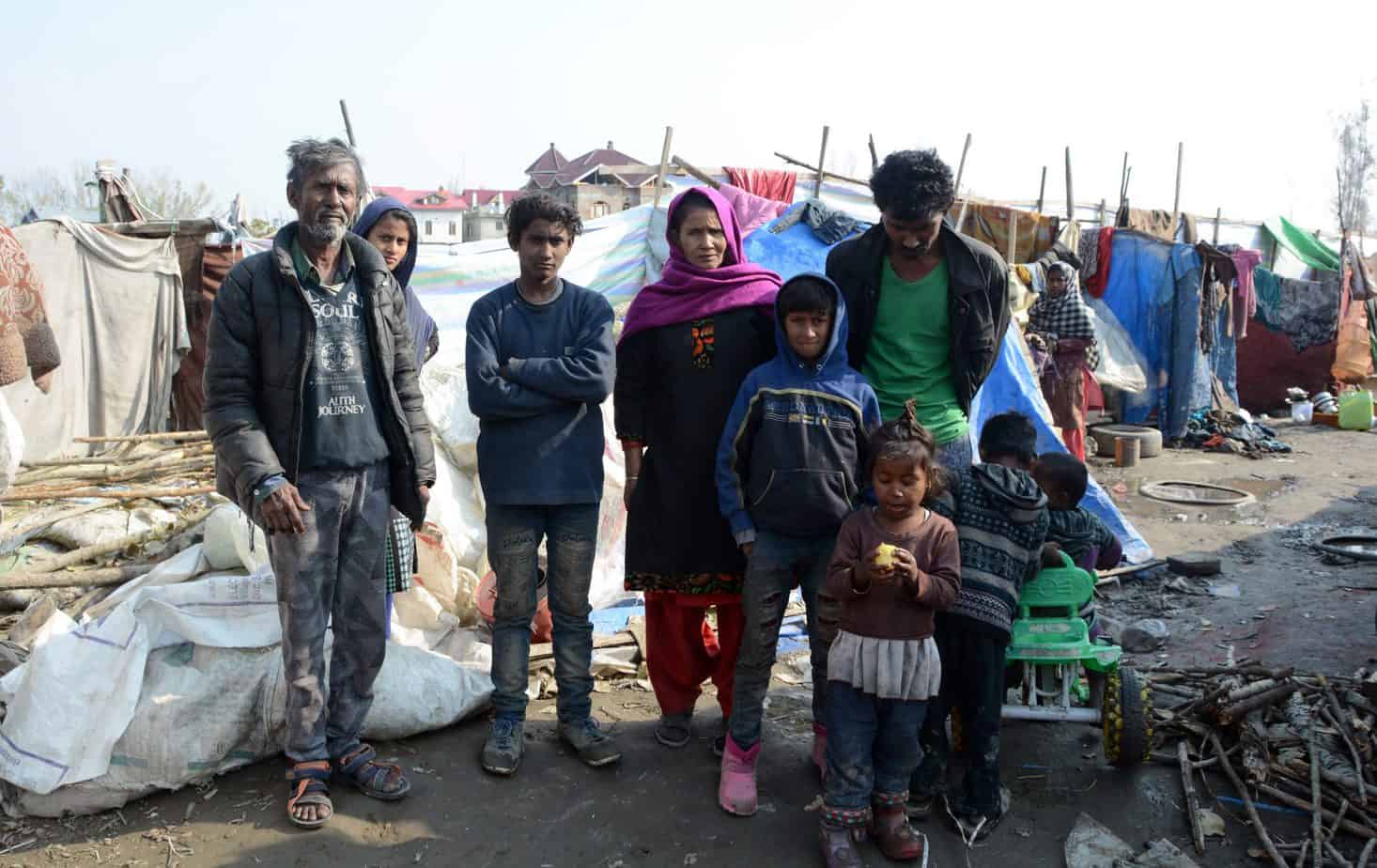When the Government of India issued an advisory on August 3rd, urging tourists and non-Kashmiris to leave the state, thousands of labourers who work in Srinagar and other areas decided to return home. However, around 150 non-Kashmiri waste pickers and their families decided to stay put in Srinagar. The city had provided them a home and livelihood for years and they believed they would be safe, despite subsequent reports of non-Kashmiri truck drivers and traders being killed
Most of these waste-pickers and their families have lived in Srinagar since the 1960s, but their numbers increased in the 1990s. “A majority of them are earning a better living than local people,” said civil society activist and noted poet Zareef Ahmed Zareef. “During harvest season, many non-Kashmiris work in the orchards and rice fields. They also work as painters, construction workers and do menial jobs such as waste-pickers”.
“The August 3 advisory created panic and many of my fellow workers decided to leave Kashmir,” said Mohammad Kabir, who originally hailed from Delhi. He lives in Srinagar with his family: two sons aged 5 and 4, and a two-year-old daughter. “Normally, we don’t send our kids to school,” said Kabir.
Though initially he did fear for the safety of himself and his wife and three children, Kabir, who has been living in Srinagar since 1998 in a tin shed at Tengpora area, decided to stay back. “I wake up at dawn and after prayers, start scavenging for discarded plastic and other things at the sites identified by the Srinagar Municipal Corporation (SMC) as dumping sites in Srinagar. I earn Rs 9000 on average every month whereas in Delhi, I used to earn only Rs 3000.”
Using a cycle-cart to ferry the waste he collects, Kabir spends three hours at the dumping sites in Srinagar every day; on weekends, he sifts the waste and sells it to dealers. “My daily earning is Rs 300 and it’s my choice whether to take to money at the end of the month or on daily basis from the dealer, who is a Kashmiri and very helpful.”
There were around 400 families of waste-pickers living in Srinagar and around 300 left after the advisory, Kabir shared. The first three-months from August 5th were tough for him too, given the clampdown and the stringent curbs put in place by the authorities. “I had saved some money and a few locals helped me with rice and other necessities. I didn’t venture out after August 5th, as there were tough restrictions on the movement of people. It was almost 90 days after the clampdown that I decided to go out for work”.
Kabir expressed his gratitude to a group of elderly men of the area he lives in for helping him and his family members survive during those three months.
Kabir came to Srinagar at the insistence of his late uncle Shareef-ud-Din who had been living in the city since 1990. “He asked me and my wife to come along and we have been living here in peace since” said Kabir. “Nobody has threatened us. We have received a lot of love from the people in Srinagar.”
At Tengpora, some 100 non-Kashmiris live in temporary shelters. One of them, Sher Muhammad Ali, was a 12-year-old boy when he arrived in Srinagar with his father Sher Ali who hails from Assam. “Srinagar is the most beautiful place,” said Sher Mohammad Ali. “People here are so hospitable and cooperative. I was never harassed by anyone even in the past three months of uncertainty nor asked by anyone to leave”. He said if he had fled Kashmir his children would have died of starvation. “My wife Shabnum helps in segregating plastic bottles from other used plastic items”.
Sher Ali goes door to door to collect old school books and notebooks. “Separation of items is a must as we get different rates for each items,” he said. “If someone from any part of the country wants to live a happy life and earn a good living, Srinagar is the best place to be in. The situation has been tense after the revocation of Article 370 but no one has harassed us”.
Shabnum said they heard about the killing of non-Kashmiri apple traders in south Kashmir districts of Pulwama and Kulgam in September, but still decided to stay put in Srinagar. “There was fear all around and many of our associates, who belonged to other religions, left Kashmir in a hurry,” said Shabnum. “We have seen tough times in Srinagar, but so far, no one has attacked or threatened us. The local heads of the area assured that there is nothing to worry. We are thankful to them.”
Most non-Kashmiris living at Tengpora have built makeshift accommodations on government land over the past 15 years. One such resident, Hassan Ahmed from Bihar said that they have recently been informed by Srinagar district administration officials that they will have to vacate the area whenever the government deems necessary.
Since the land was open and unused by the government for years together, initially a few families set up their makeshift tents on the land. As time passed, they invited others as well. Now that the valley is slowly limping back to normal, all the non-Kashmiri waste-pickers have resumed their normal activities of collecting scrap.
“All of us are moving freely in Srinagar city now as there are no curbs. We wake up early in the morning every day to collect waste from various areas,” said Hassan Ahmed, another non-Kashmiri from Assam, who collects scrap from old city areas of Srinagar. He says even though his livelihood sustained a jolt since August 5th of late, demand has gone up again and he expects an increase in his monthly income. “This winter, my target is to earn Rs 40,000 (from November to March),” said Hassan. “Last year, it was between Rs 25,000 to Rs 30,000 during this period.”
| Also read |
